Why Medium Isn’t a Good Choice for Your Business Blog

These days, Medium is a vast network of blogs run by individuals and businesses, gathered up in collections and publications, and circulated widely around the internet. It's no wonder that small businesses often think that using such a platform would be a good idea for their blog.
Is it? I don't think so – and I'm not the only one – and here's why.
Medium Pays You, But Not Enough
One of the main selling points that I've seen people mention for Medium is that anyone, even a novice blogger or a new business, can jump in and start making money.
This is true, and I won't deny it. You can jump in and start making money just as soon as you start writing content that people like enough to start paying you for.
There are two drawbacks to this. The first is that, given the hundreds of thousands of other people and brands writing content on Medium, it's incredibly difficult to get enough attention that your content actually makes much money. You might end up making a meager few cents for each post; less than you'd make with Google ads on a WordPress site. If something goes viral, you might make a few hundred dollars. Not exactly something you can make a living off of.
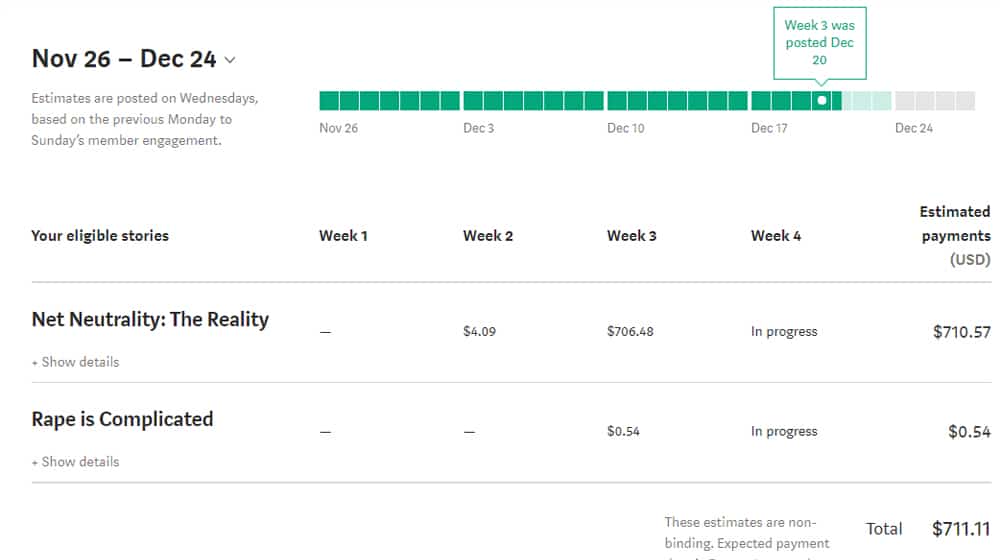
The other drawback is right there; you can make more money with other means of monetization. Medium doesn't allow you to run ads, add affiliate links, or even really publish a call to action anywhere other than as a text link. You can take advantage of much more advanced and more compelling calls to action on your own site, and make much more money from a smaller audience.
That's not to say Medium doesn't have calls to action; they just benefit Medium, not you.
Medium Has Too Much Competition
Competition on Medium is fierce. If you're trying to write content for Medium, you're competing not just against other writers on Medium, but every writer in your niche who has their own site.
Competition outside of your domain is nothing new for a business blog, but competition within it definitely is. Google isn't going to flood their search results with Medium links, after all. If ten different websites write posts on a topic, all ten of them can have space in the search results for that topic. If ten different writers on Medium write articles on one topic, only one or two of them are going to show up in the Google search results for that topic. You're heavily restricted before you even get a foot in the door.
Medium's Publications Remove Your Identity
One of the most frequently touted benefits of Medium is their Publications system. Publications are basically magazines or collections. One person or a group of people organize curation for their publication. For example, The Economist manages a publication where they curate content from their own account, the accounts of influential writers in their niche, and other relevant content that is submitted to them.
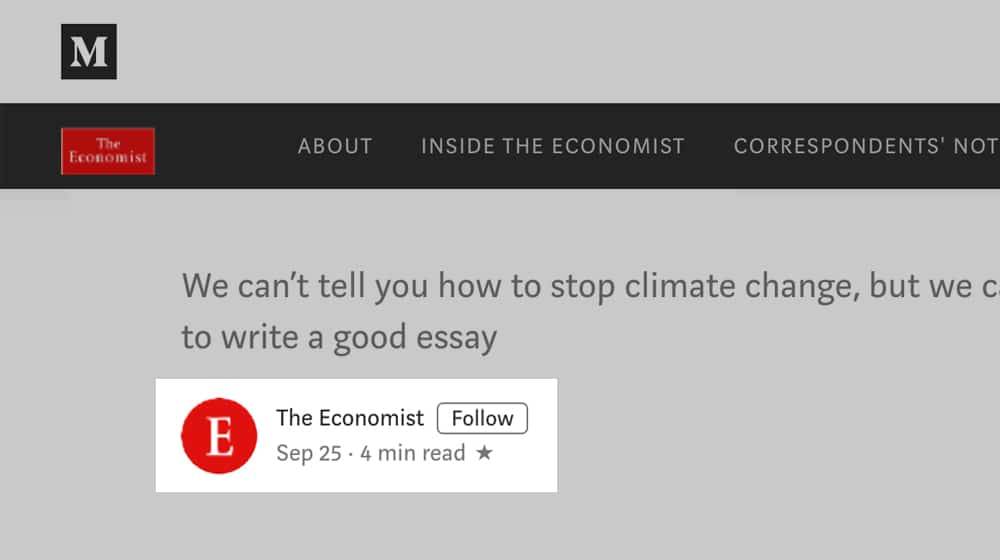
There are two problems with this. The first is that, if you write for The Economist on Medium, you're still writing for The Economist, not for yourself. More importantly, the people who subscribe to The Economist's publication aren't going to care who you are. They see a bunch of different authors of content, but they don't care one lick about those authors. To them, you're just another part of The Economist. You have no real chance to build your own brand from within another brand's publication.
Medium Alienates Some Readers with Paywalled Content
In a struggle to monetize as their venture funding was running out, Medium introduced paid plans and started hiding content behind paywalls. This means that users who don't have a paid account can't read everything on Medium. In fact, if you want to monetize on Medium, you need to paywall your content for the best effect.
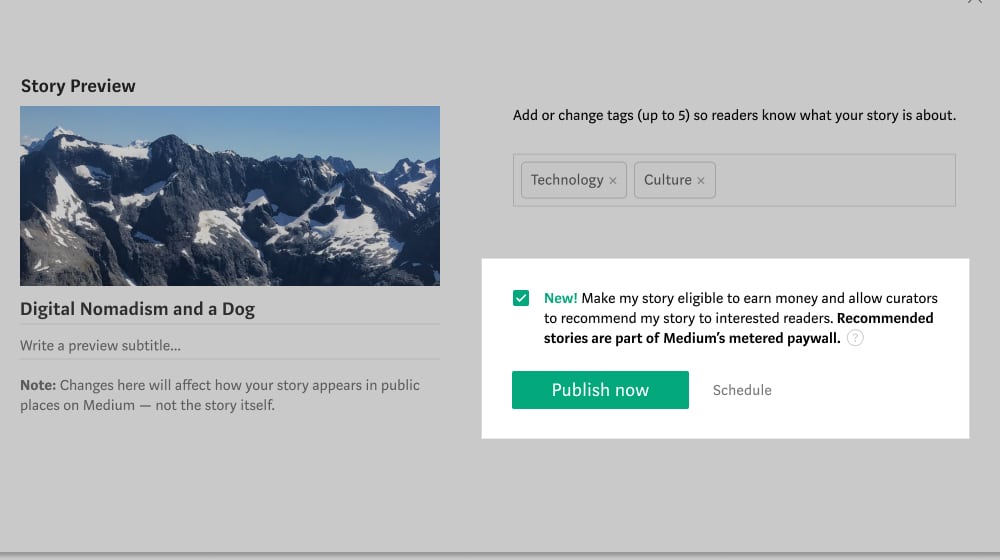
What this means is that a lot of readers who have either used up their free quota of article views for the month, or who simply don't want to pay for an account, are going to encounter a paywall rather than read your content. What are they going to do about it? Leave, probably. I know when I've run into paywalled content, even if it seemed interesting, it wasn't "pay a subscription to read it" interesting. I just find another resource to read instead.
Medium is Biased Towards Certain Topics
Medium is ostensibly a publication that allows topics of every kind, but the people who read Medium do it to look for certain kinds of content. If you visit their front page, you'll see a cross-section of that kind of content. What kinds do you see? Tech, Design, Business, Marketing, Entrepreneurship, Politics, Culture, and so on.
Are you a small business in the plumbing industry? Are you interested more in history than in current events? Are you a business looking to build a following in a fashion bubble? Sorry, you're probably going to be out of luck. The top referrers for traffic to Medium, other than Google, are sites like ycombinator, hackernoon, and github.
Medium's Benefits are Not Unique
Medium has a lot going for it, but none of those benefits are unique.
- Monetization? Sure, just throw some ads on your site and you're just as monetized as they are.
- A ready-made audience? I guess, except Medium's audience isn't your audience, so you still have to work to attract them.
- Notifications when new content is published? Man, RSS and Atom feeds have existed for decades.
- Speed? People think WordPress is slow, but just grab the Genesis framework or something, it's not hard.
- Themes? You have way more flexibility to create a good site design on your own than with Medium.
Everything Medium has to offer is something you can do better with your own site. Sure, it means you have to actually do it, but in a lot of cases it's as simple as copying and pasting some code, or installing a WordPress plugin. It's really not that difficult.
Medium Controls Their Own SEO
Medium is simple to use, but part of that simplicity is the removal of control. When posting on Medium, the only SEO control you have is content-based. You can optimize your headlines and do keyword research to know what kinds of topics and keywords you should be using, but it's still all restricted to just your writing.
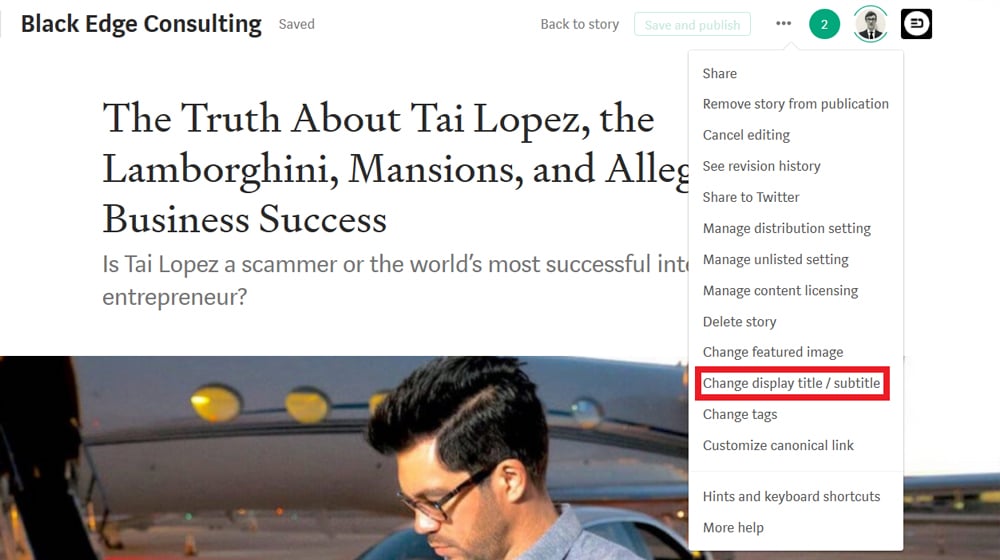
Want to specify some meta data for your snippet? Want to change the design of your Medium blog? Want to redirect a page? Want to set follow attributes for your links? You're out of luck. You can't do much of anything more advanced than embedding a social media post or specifying the alt text for an image you upload. Everything else is controlled by Medium, and you don't get a say.
Medium Doesn't Allow Split Testing
Alright, so split testing is an advanced technique mostly just used by marketers to gain incremental improvements, but it's still a valid technique for blog posts. Sometimes you might want to run your post with two different variations in your title, to see which one draws the most attention in the shortest amount of time.
You can edit your posts on Medium, but you can't split test them. Any testing you do has to be sequential, and traffic drops off very quickly for pretty much every post. There's simply so much content being published to Medium at any given time that your ability to stay in any preferential location for long is severely limited. Front page visibility? Gone in a matter of hours.
Medium Lacks Extensions
There are a lot of things you might want to do with your blog to enhance its ability to do its job. Maybe you want to embed some fancy content, like a lightbox, a slide-in call to action, a Hello Bar, or a slideshow. Maybe you just want some internal tracking for your links. Whatever it is you want, sorry, you're out of luck with Medium.
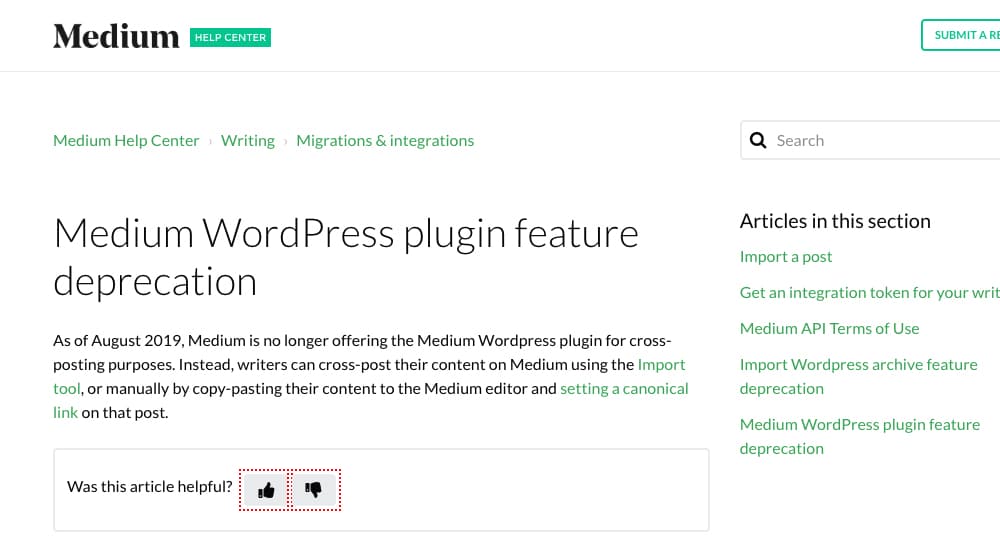
There's no way to add any sort of extension-based enhancement to Medium blogs. No advanced features, no optional features, no changes in layout; it's all specified by the site itself. You have to work with what you have, which is the same as what everyone else has, and there's no way for you to take advantage of it in any clever or unique ways.
Medium Restricts Unique Branding
There's very little that you can add to a Medium article that gives you any unique branding at all. If you're lucky as a brand or as one of the top publications, you can get a logo up at the top of the page, next to the prominent Medium logo that can't be removed. Your author credit is very small, under both the title and subtitle, and it's a very small image and smaller name. This can be your personal name or brand name, but it's still very minimal. You don't get to change colors, add more logos, or do anything else to indicate your branding.
Publications have a little more control, but then you need to be the one in charge of the publication, and that's not always a benefit. Just because you make a publication doesn't mean you get any attention given to it, since anyone at all can make a publication. It just adds an extra step and makes you the target of spammers who want to get featured in every publication they can.
Medium Offers Very Little Analytics Data
Years ago, Medium had Google Analytics integration, allowing you to see as much data about your posts there as you can on your own site. These days, they only offer their own limited analytics suite. It is, to put it nicely, much worse than Google analytics. Plus, it doesn't play nicely with your own site's analytics. If you want to track anything more than basic "from medium.com" referrer data on your own site, you will need to make sure you're carefully UTMing every link you use, and that's a huge pain.
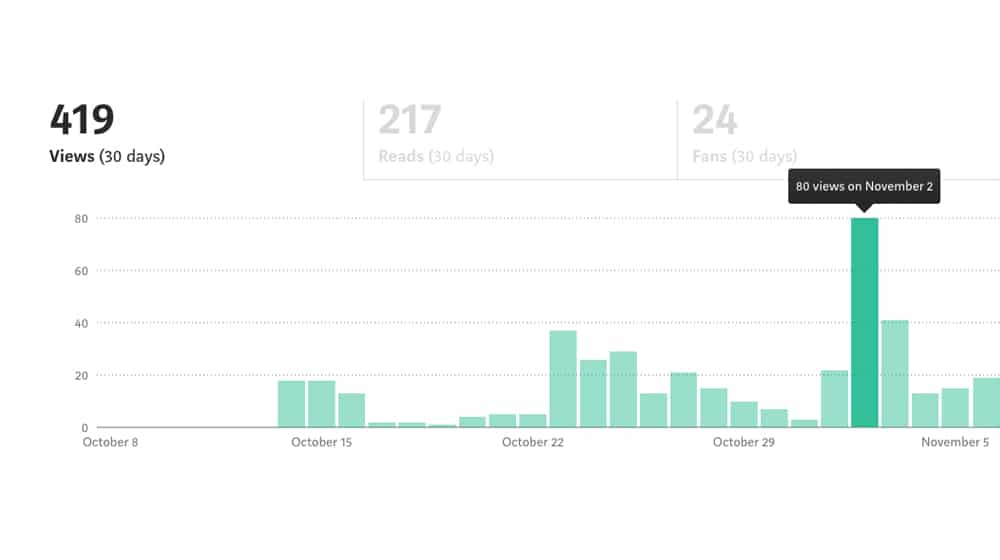
Oh, and if you want tracking for something like Facebook Insights? Sorry, you're out of luck there as well. The best you can get is embedding a Facebook post and tracking a little bit of data through it.
Medium Doesn't Care About You
Possibly one of the biggest problems with using Medium as a platform is that Medium does not really care about you. There's no world in which they care about any but maybe the top ten brands that use their platform, and even then, as long as nine of them stick around, they don't care about the tenth.
Medium is a platform that is in it for itself. If they fail to make money, they're going to make changes to make more money. If that means putting restrictions on small accounts, going pay-to-play, or running ads all over content, they won't hesitate. And if it comes to a point where their site is no longer profitable, they can close down entirely without warning.
Not to mention that, if they take issue with something you write for one reason or another, they can completely freely delete your content or your entire account. You are completely beholden to them. Is that something you want as the foundation of your business?
How to Effectively Use Medium
Now, despite everything I've said above, I won't tell you that you shouldn't use Medium. In fact, you can use Medium quite effectively and even come out ahead on the game. There are a few ways you can do it, so let's talk about them a bit here.
You can republish posts on Medium for a traffic boost. Instead of treating Medium as a place to write your blog posts, instead treat it as a place to archive them. When you write a post, publish it on your blog and promote it through your social media, doing everything you normally do to drive traffic to a post.
Then, a week or two later, once the traffic is dying down and you're publishing new content on your blog, take the old post and syndicate it on Medium. Publishing it on Medium can give it some additional exposure to an audience that might not have seen your content in its original location.

The one potential problem everyone points out with this is duplicate content issues. On the one hand, it's possible that Google will mistake you syndicating the content as copying content, and penalize one of the two sites for it. Usually that's not going to be the big-name page, it's going to be your site. The other option is that Medium's SEO weight simply overpowers your site, but that's why you add the delay; so that any value your site was bringing in with it is already mostly exhausted.
You can use Medium as a CEO Insights blog rather than a business blog. Your business blog is for articles you write as a company, published under the company name, and reflecting the company vision. Medium is a way you can gain more value independent of your own business. Write from the perspective of the owner of the business, and cover topics, release insights, and talk more casually than you can on your business blog.
One benefit to this is that if you ever sell your business or step down as owner, you can maintain your Medium blog with its audience to help boost whatever your next venture is.
You can treat Medium as a way to guest post with some structure. If you like, you can focus on Medium entirely as a guest posting platform. Don't worry about posting the same content you do on your blog; keep your blog on its own. Write fresh content for industry publications on Medium, with links to related posts on your blog, and operate it as you would a guest posting opportunity. This is probably one of the best ways to use Medium, in my opinion.
What do you think? Is it worthwhile to run your company blog on Medium, or is keeping it separate a better idea? Let me know in the comments!










December 30, 2019
Hi James, if I've already started blogging on medium, do you recommend moving to a different platform? I'm using it as a sole blog right now mainly due to the ease of setup but after reading your post I'm having second thoughts. Thank you and I hope to hear from you
January 04, 2020
Hi Aby! What you could do instead of deleting your posts from Medium is simply to copy them over to your Medium site, then set the Canonical link to point to your blog post on your site. This way, you won't have to worry about duplicate content, as it will tell search engines the primary version of that post is located on your main blog instead of Medium.com. Medium has a good guide on that here. Hope this helps!
December 08, 2020
Hey James! I thought of reposting my articles to Medium but I have doubts about it as I might get penalized. Your thoughts?
December 11, 2020
Hey Jeffrey! I would look into canonicalization on Medium.
You can specify the original article and that informs Google that you're not plagiarizing so they understand the original source is on your site.
This is what most bloggers do on Medium and it's the safest route.
Even if you don't do this though, Google is likely smart enough to figure it out. Everyone uses Medium to syndicate their posts 🙂
August 18, 2021
Facts! Just finished migrating my Medium blog to WP. Do you know if I still syndicate my articles from WP to Medium?
August 18, 2021
Hey Dean,
Sure, I don't see why not!
A popular choice is to include a third of your article, with a "Read more" link at the bottom that points to the full article on your WordPress site. This strategy could work well for you too.